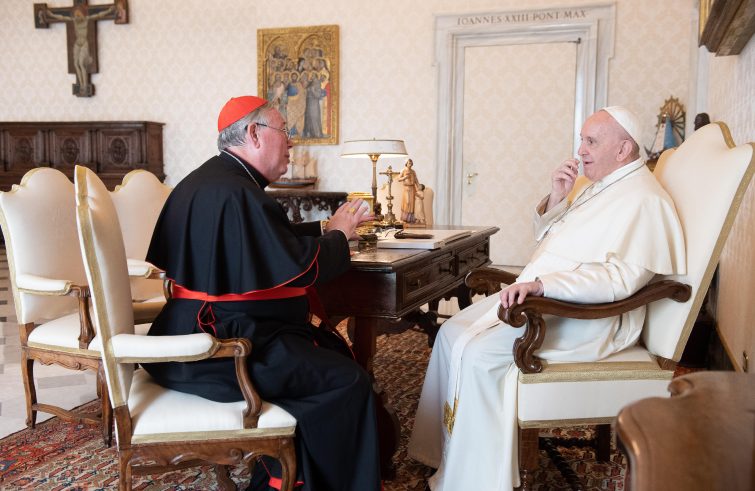
“We discussed the ordinary matters of COMECE and of course our thoughts went to the situation in Lesvos island. The Pope is deeply concerned about it.” Before leaving Rome for Luxembourg, Cardinal Jean-Claude Hollerich, President of the Commission of the Bishops’ Conferences of the European Community, accepted to speak to SIR about the meeting he had last week with Pope Francis, coinciding with the terrible news of the fire that devastated Moira refugee camp in Lesvos. Cardinal Hollerich took part in a mission to Lesvos on behalf of Pope Francis last year, accompanied by Cardinal Konrad Krajewski, to visit the refugee camps of Moria and Kara Tepe. “We spoke with the people, we entered their tents. What impressed me the most was their utter lack of hope”, the Cardinal recalled. “Over the past few years we expressed beautiful thoughts on human rights and European values. There are people who believed in what we were saying. But when they arrived at the borders of Europe they realized that we had been lying to them. We should also be careful when we refer to the Christian identity of Europe whilst mentioning the fact that we can’t go to church, pray to God and at the same time doing nothing about the fact that there are people who are suffering and dying. This is not acceptable.”
 Lesvos is a clear example that shows to Europe that the hotspot route is no longer viable. What solution do you envisage as European bishops?
Lesvos is a clear example that shows to Europe that the hotspot route is no longer viable. What solution do you envisage as European bishops?
I would be grateful if the Episcopal Conferences of Europe had the opportunity to speak with their governments and tell political leaders that the Church expects hospitality. After the devastating fire at Moria refugee camp, France and Germany announced their availability to welcome most of the 400 unaccompanied minors that the EU has said it is ready to receive. But that is not enough. This figure is almost ridiculous.
The problem is much more complex and if we don’t solve it now, we will be faced with even greater tragedies.
 What can be done? What is the plea to Europe coming from all those people stranded in the refugee camps from Libya to Lesbos, to Lampedusa?
What can be done? What is the plea to Europe coming from all those people stranded in the refugee camps from Libya to Lesbos, to Lampedusa?
Open your doors. If we don’t open our doors to refugees, we are closing the doors also to Christ. If we want to open our doors to Christ, we must also open our doors to the refugees. The Sant’Egidio Community, with its humanitarian corridors, has shown us how. Italy has also offered an example of how to respond in a much more Christian way compared to other countries.
How come wealthy northern countries do nothing or almost nothing?
Europe is lacking a point of reference to Christianity and humanism.
You previously said that you spoke with Pope Francis about themes that are of primary concern to COMECE. What is the Holy Father’s idea of Europe?
I believe that for Francis Europe is the ultimate guarantor of a form of multilateralism that ensures a certain degree of peace and justice. With this I am not saying that everything the Union does is good. What I’m suggesting is that it would be worse without the European Union, and not only for Europe, but for the rest of the world. Just imagine if the European Union didn’t exist: there would be no centre of balance between the great super powers, Russia, China and the United States.
The world needs the European Union. I think this is the Pope’s view. And he is extremely concerned.
Rounds of negotiations continue between the British government and the EU on post-Brexit trade agreements. As European bishops, what are you asking?
 It’s very important that the fraternity between the citizens of the United Kingdom and the citizens of the European Union is stronger than whatever could divide us politically. I call on politicians to work to ensure that this closeness will continue in the future.
It’s very important that the fraternity between the citizens of the United Kingdom and the citizens of the European Union is stronger than whatever could divide us politically. I call on politicians to work to ensure that this closeness will continue in the future.
Your Eminence, schools will reopen in Italy on Monday, September 14. They have reopened already in most of Europe. It will be a difficult start for everyone owing to the fear of the epidemic. What is your message to students?
I wish them to live in fullness. Life is always beautiful even when it is difficult. We are facing a difficult moment that requires sacrifices. They will have to wear masks, there will be rules that must be observed, they will not always be able to meet all their friends together.
But life is nevertheless beautiful. And the future belongs to them.
God loves them and this love of God, if discovered, is the most important thing in life. When there are no more points of reference, when happiness and gratifications are lacking, the love of God is always there to accompany us.
Italy was shocked by the tragedy of a boy massacred and beaten to death on the outskirts of Rome.
 Their hate stems from the belief that in order to resist hate is the only option. It’s their life experience. We must make them understand that it’ s not true, that crime destroys their own future.
Their hate stems from the belief that in order to resist hate is the only option. It’s their life experience. We must make them understand that it’ s not true, that crime destroys their own future.
We must say no more! We must firmly repeat: no, this is not the way!
Indeed, we are confronted with new forms of barbarism. In this respect, I have sought to speak to the young people of my diocese about virtue. It may sound like a word from another era, but in order to be happy, we must know how to opt for goodness and do so with all our heart. Hate always leads to death; not only to the death of others, but also to our own death. It’s a question that involves us all.
The world we are leaving to the younger generations is a world where the economy occupies the entire space. Those left on the margins of economic development no longer see any meaning to their lives and their actions.
It is therefore necessary to say “no more” even to those who give priority to economic profit and not to the human person.











